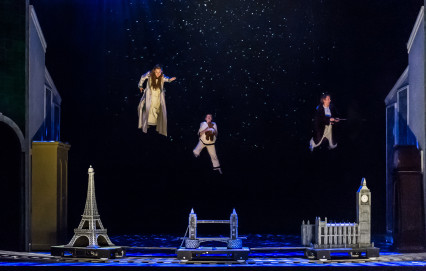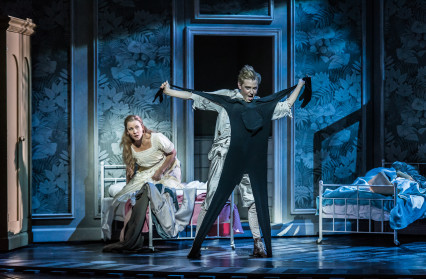Wales Millennium Centre, May 16 2015
Music by Richard Ayres
Libretto by Lavinia Greenlaw
Directed by Keith Warner
Conducted by Erik Nielsen
Cast includes Iestyn Morris / Marie Arnet / Hilary Summers / Ashley Holland / Nicholas Sharratt / Rebecca Bottone
‘Follow Peter out through the window and fly with us to a land filled with wonder’. Welsh National Opera’s leaflet copy for Richard Ayres’s opera Peter Pan very much promises an unproblematic setting of a classic children’s text and an opera-friendly family show. And, indeed, with a special family offer of £1 per seat for children, Wales Millennium Centre was packed to the rafters last Saturday for its opening night. Jason Southgate’s sets, with steam trains, toy Edwardian houses, alphabet blocks and men in bowler hats, set the tone for the ‘Edwardian fantasy’ the brochure promised. As the evening developed, a sense of pantomime crept in: the audience roared to bring Tinker Bell back to life and then happily booed Captain Hook at his curtain call. Peter Pan seemed to tick all the right boxes: young (very young) audiences, a good family show, but also contemporary opera with a score not afraid to mix moments of musical sweetness with an almost Birtwistle-like astringency.

Credit: © CLIVE BARDA/ ArenaPAL
J M Barrie’s Peter Pan has, at its centre, a dark fantasy bound up with problems of maturity and empathy, imbued with a sharp sense of social critique. It’s easy to see how it fits into WNO’s current season, ‘A Terrible Innocence’ (the other operas are Mozart’s The Magic Flute and Debussy’s Pelléas et Mélisande). Yet it contains social stereotyping that is now difficult to accept, particularly in the relationship of women to men, that this opera follows uncritically. Librettist Lavinia Greenlaw ‘had quite strong feelings about it’, but one wonders what these were. The libretto follows much the original narrative, accepting the social norms of the time but losing some of its darker aspects (for example, the final section of the book where Peter encounters the older Wendy, and the problems arising from his refusal to take the responsibility of maturity).
But perhaps this is to ask for too dark a vision. Ayres himself ‘wanted to make something that I could take my 8-year old daughter to that both she and I would enjoy.’ Much of his previous music is often bold and anarchic, turning convention on its head: composer Christopher Fox describes it as having ‘a child-like quality and like child’s play it seems to lack the linear logic which we are used to in most European art music.’ In the concert hall, his work brilliantly raises all sorts of uncomfortable issues to do with the conventions of music, but this score often follows the libretto in a literal fashion, rarely digging under the surface. This is not to say that there are not many delicious moments of typical madcap fantasy that one admires in so much else of Ayres’s music, and the ear is constantly beguiled by wonderful musical ideas.
The co-production with Komische Oper, Berlin, projects the charm of the Edwardian period combined with the acrobatics and pantomime world of Peter Pan’s adventures. Ran Braun’s aerial and flight direction projects wonderfully the sense of flight, whilst Keith Warner’s production sparkles with disciplined vitality. Conductor Erik Nielsen guided the Welsh National Opera Orchestra through the not inconsiderable complexities of the score with aplomb.
The cast, led by Iestyn Morris’s Peter Pan is uniformly fine, entering into the whole with energy and commitment. The idea of Pan as a counter-tenor is something of a stroke of genius on Ayres’s part, projecting the other-worldly detachment so vital to his character. Soprano Marie Arnet’s warmly projected Wendy is a well-chosen foil, and baritone Ashley Holland’s doubled up the roles of Mr Darling and Captain Hook, bringing them just the right vocal darkness and presence. Hilary Summers’s Mrs Darling (doubling with Tiger Lily) is a welcome reintroduction of the contralto voice into contemporary opera. Indeed, Ayres gives the whole concept a real sense of variety of characterisation throughout with his careful choice of different vocal timbre.
If you can put the above caveats aside, Peter Pan is a great night out for the family. But, like Peter Pan himself, this is a piece that too easily accepts and apes the most conventional aspects of Barrie’s book without ever reaching under the surface.
Peter Pan has two further Cardiff performances on 23 & 31 May and then tours to Birmingham and the Royal Opera House, London. Further details: https://www.wno.org.uk/event/peter-pan
Banner photo of Marie Arnet (Wendy) and Iestyn Morris (Peter Pan) by Clive Barda.











